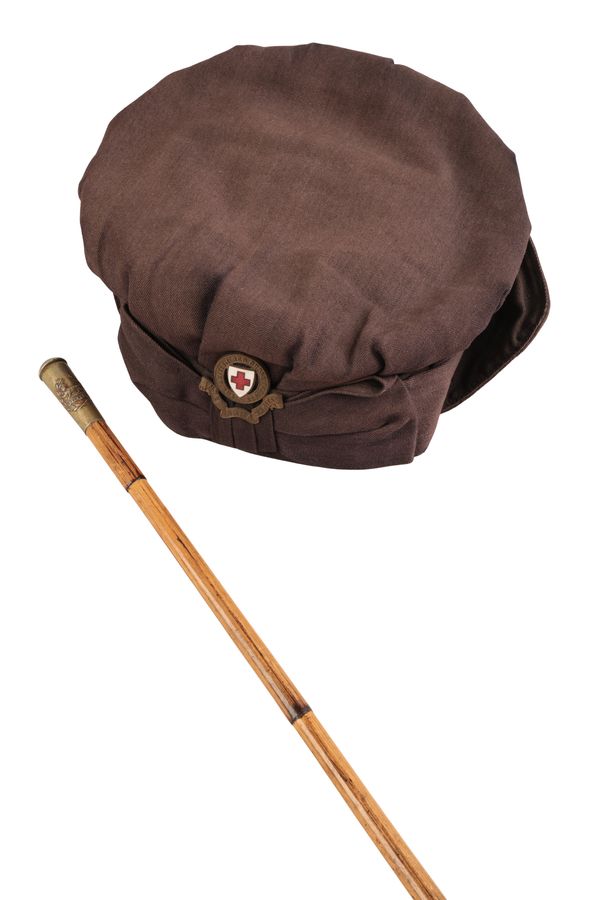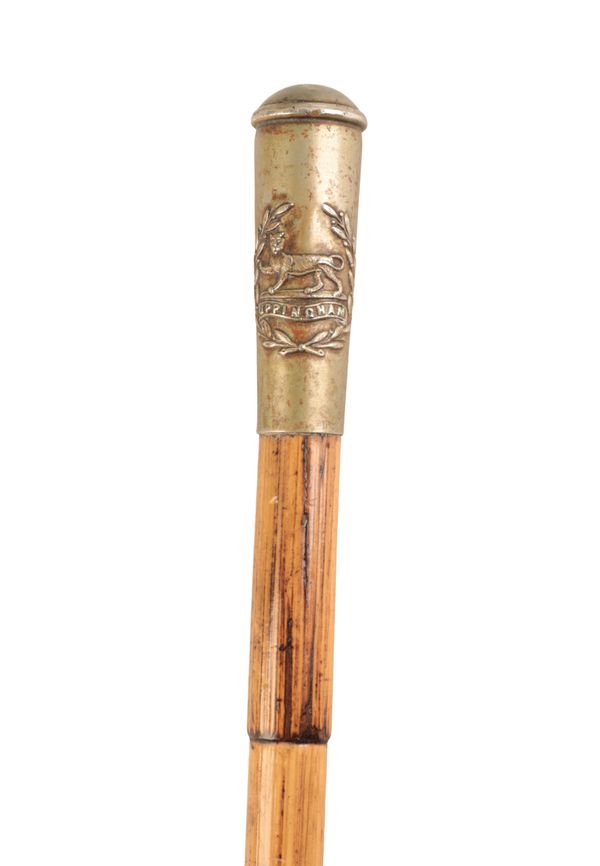together with Edward Brittain's Uppingham School swagger stick (2)
| Estimate: | £1,000 - £2,000 |
Provenance: This VAD Hat and Uppingham School swagger stick, were bought in 1981 from the then owner of the Brittain family home - Melrose on Park Road, Buxton. A very well-respected militaria dealer attended the address to buy some other antiques. When he was leaving the owner asked if he would be interested in these two items that had been found in the property. He explained to the dealer the Brittian family had previously lived in the property.
The VAD hat has some sun bleaching and shows signs of wear. The Uppingham School Swagger Stick is in good condition
Vera Brittain was one of the most important feminists of the 20th Century. There can be little doubt that what she endured during the Great War was a shared experience, not just amongst her peers, but one that transcended the class divide. That shared experience was the tragic loss of family, loved ones, friends, acquaintances, husbands and fiancées, on the Western Front, at Gallipoli, on the sea and in the air. The Great War necessitated that the role of women in British Society changed, much is written of the Woman’s Land Army and women working in munitions factories during the Second World War, the same roles took place during the First World War.
Vera Brittain was born in Newcastle under Lyme on the 29th of December 1893, the daughter of Arthur and Edith Mary Brittain. The family moved to Macclesfield when Vera was 18 months old. In 1905 the family moved to Buxton in Derbyshire where Vera attended boarding school at Saint Monica's in Kingswood Surrey. Her brother Edward was born in 1895 and was a close companion throughout her childhood.
Edward attended Uppingham School and along with his friend Roland Leighton was a member of the OTC. Vera would grow close to Roland with the two eventually becoming engaged in August 1915.
In 1914 Vera attended Oxford to read English despite her parents initial worries. The Great War had already broken out. She left her studies after one year to become a nurse in the VAD (the Voluntary Aid Detachment).
Roland and Edward both enlisted in the army gaining officers commissions. Roland would sadly die of wounds on the 23rd of December 1915 after being shot by a sniper and suffering catastrophic wounds.
Edward served with the Sherwood Foresters and won the Military Cross. He was killed in action in Italy on the 15th of June 1918 during the second Battle of the Piave River. It is believed that Edward went out looking to be killed in action. It had been discovered that Edward had had homosexual relationships with men in his company. The commanding officer of his battalion Colonel Charles Hudson had been informed that once his company had left the line Edward would be court martialed.
Vera initially served in the VAD at the hospital in Buxton and then in London before she went overseas serving in Malta and in France on the Western Front. The death of her fiancé Roland and that of her brother greatly affected the rest of her life.
She returned to Oxford in 1919 and for the rest of her life was a committed socialist, feminist and pacifist. In 1933 her best selling memoir 'Testament of Youth' was published. In 1925 Vera married George Caitlin and went on to have two children, John and Shirley. During the Second World War she helped the war effort by working as a fire warden and she also travelled around the country raising funds for the Peace Pledge Union's food relief campaign. She spoke out about the mass fire bombing of German cities which created a huge backlash against her. Ironically in 1945 the Nazis black book, which was produced before Operation Sea Lion was to be implemented in 1940, showed that Vera was among 3000 people listed in the book to be immediately arrested and likely placed into a concentration camp.
During the 1950s and 1960s she spoke out in favour of nuclear disarmament, was against the apartheid and very much against colonialism.
She died on the 29th of March 1970, one of her final requests was that ashes be scattered on her brothers grave in Italy.






